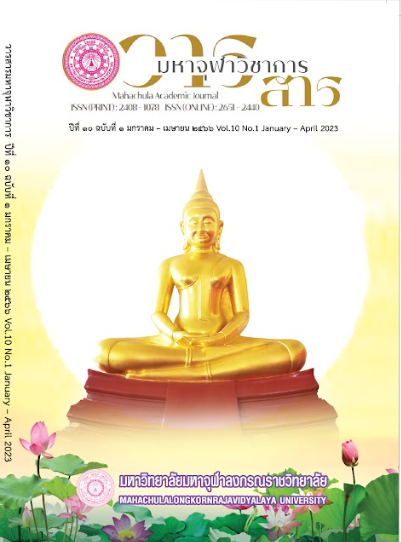The Effects of Providing Cooking Activities by Using Inquiry Process to Develop Food Literacy of Young Children
Main Article Content
Abstract
The purposes of this study were (1) to study the change in food literacy of young children providing cooking activities by using inquiry process and (2) to compare food literacy of young children before and after providing cooking activities by using inquiry process.The target group consisted of 15 boys and girls, aged between 5 - 6 years old. They were studying in kindergarten level 2, second semester of academic year 2021 at Lamchedee School, Nongchok District Office, Bangkok. The tools used in this study were (1) cooking activities by using inquiry process lesson plan (2) an assessment form of food literacy of young children which consisted of 3 aspects as food knowledge, food skills and food behavior (3) observational form and behavior recoding form in food literacy of young children. The data were analyzed by mean and standard deviation. Qualitative data were analyzed by content analysis.
The results of the study revealed that (1) young children who received providing cooking activities by using inquiry process had higher scores of food literacy add more. The aspect that had the most change in descending order was food behavior, food skills and food knowledge respectively. And (2) young children who have been participated in cooking activities by using inquiry process to promote food literacy. The mean scores on food literacy after the experiment were higher than before when using this activities.
Article Details

This work is licensed under a Creative Commons Attribution-NonCommercial-NoDerivatives 4.0 International License.
References
กระทรวงศึกษาธิการ. หลักสูตรการศึกษาปฐมวัย พุทธศักราช ๒๕๖๐. กรุงเทพมหานคร: โรงพิมพ์ชุมนุมสหกรณ์การเกษตรแห่งประเทศไทย จำกัด, ๒๕๖๐.
ปรมาภรณ์ ทองสุ. “การพัฒนาการคิดทางบวกสำหรับเด็กปฐมวัยด้วยกิจกรรมการเรียนรู้แบบสืบเสาะหาความรู้”. ปริญญานิพนธ์การศึกษามหาบัณฑิต (การศึกษาปฐมวัย). บัณฑิตวิทยาลัย: มหาวิทยาลัยศรีนครินทรวิโรฒประสานมิตร, ๒๕๕๐.
วัฒนา มัคคสมัน. การสอนแบบโครงการสำหรับเด็ก. กรุงเทพมหานคร: สำนักพิมพ์แห่งจุฬาลงกรณ์มหาวิทยาลัย, ๒๕๕๔.
สถาบันส่งเสริมการสอนวิทยาศาสตร์และเทคโนโลยี. คู่มือการจัดการอบรมเชิงปฏิบัติการเพิ่มพูนศักยภาพศึกษานิเทศก์และครูปฐมวัย. กรุงเทพมหานคร: บริษัท โกโกพริ้นท์ (ไทยแลนด์) จำกัด, ๒๕๕๓.
สุคนธ์ สินธพานนท์. การจัดกระบวนการเรียนรู้เน้นผู้เรียนเป็นสำคัญ. กรุงเทพมหานคร: อักษรเจริญทัศน์, ๒๕๕๑.
สำนักงานสถิติแห่งชาติ. รายงานผลฉบับสมบูรณ์ โครงการสำรวจสถานการณ์เด็กและสตรีในประเทศไทย พ.ศ. ๒๕๖๒. กรุงเทพมหานคร: สำนักงานสถิติแห่งชาติ ประเทศไทย, ๒๕๖๓.
Bruner, J. S. The process of education. Cambridge: Harvard University Press, 1960.
Cullen, T. et al. “Food Literacy: Definition and Framework for Action”. Canadian Journal of Dietetic Practice and Research. vol. 76 No.3 (2015): 140-145.
Dewey, J. The Middle Works 1899-1924. London and Amsterdam: Feffer & Simons Inc, 1976.
Jackman, H. L. Early Education Curriculum: A Child's Connection to the word. Albany NY: Delmer, 1997.
M. Marmot and R. Wilkinson. Social determinants of health. 2nd ed. Oxford: Oxford University Press, 2006.
อรพร ดำรงวงศ์ศิริ. แพทย์ชี้เด็กไทยยุคใหม่อาจขาดสารอาหารเพราะพฤติกรรมการกิน. [ออนไลน์]. แหล่งที่มา: https://th.theasianparent.com/childred-lack-of-nutrients [๙ มีนาคม ๒๕๖๔].


